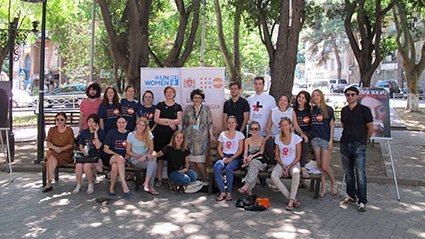“Ride for Women’s Rights” visits Georgia to Promote Gender Equality and Women’s Rights
On July 10, 2015, the Netherlands-based charity NGO “Ride for Women’s Rights” (R4WR) traveled to Tbilisi, to meet with the UN Women Representative in Georgia, Assistant Representative of UNFPA Georgia, Members of the UNFPA Youth Advisory Panel, UN Youth Delegate – Georgia and Youth Activists, in order to receive first-hand information on women’s and girls’ rights and the gender equality situation in Georgia, as well as share experiences and youth vision on gender-related issues in the country. The meeting took place in the Round Garden, in front of the UN House in Tbilisi. Within the frames of the meeting, an outdoor photo exhibition on Youth, Healthy Lifestyle and Gender-based Violence was organized.
R4WR was founded by four young women from Amsterdam who “are committed to creating awareness for women’s rights worldwide and inspiring others to join the efforts in bettering women’s lives”. R4WR has three main focus areas and believe that every girl and woman should have the right to Family Planning, Gender Equality and Education. They started a fascinating 400-day trip last September in Jakarta, Indonesia, and aim to cycle all the way to the Netherlands, which means cycling some 14,000 kilometers and passing through 22 countries in total. The distance that the girls pass [in one go] when on the road is around 70-80km.
“After graduating from university, we wanted to engage in something truly meaningful. We also wanted to travel, so we combined the two and set a goal of traveling with bikes around the globe with the cause to create awareness for women’s rights in our home country, the Netherlands, as well as all the countries we pass through on our journey. Many people take much of the women’s rights and equality in our region for granted, so we wanted to know about the experiences of those women, who are often unable to make different choices and practice their rights,” said Monique, one of the members of R4WR.
While discussing the different gender-related issues in Georgia, the Assistant Representative of UNFPA Georgia Country Office, Ms. Lela Bakradze told the members of R4WR:
“Along with the violence against women, the practice of early marriage is also present in Georgia. Qualitative research conducted in 2013 by UNFPA showed that it is practiced across the country among different ethnic groups, although its causes and practices vary and largely depend on geographical and cultural factors,” added Ms. Bakradze. “Unfortunately, the seriousness of child marriage and its negative impact on girls’ future and sustainable development is not fully recognized by society. Child marriage primarily deprives a girl of the opportunity to receive education and make informed decisions about her future. A girl who is 12 years old today will in 10 to 15 years be shaping the future development of the country. Therefore it is of utmost importance to create an environment which will enable girls to fully realize their potential.”
Another issue discussed at the meeting was gender-biased sex selection practice. Besides being a radical strategy of gender discrimination, prenatal sex selection will also lead to future population imbalances. According to UNFPA research, it had already been estimated that in 2010 about 25,000 girls aged 0-19 years were missing from the country’s population owing to the sex imbalances at birth that had occurred since the 1990s. Most probably, the main source of change will be the transformation of cultural attitudes resulting in a decline in son preference and strengthening substantial gender equality.
At the end of the meeting, the young women from R4WR were handed the gifts from the UN Agencies, including informational materials, T-shirts and bags. R4WR left for Yerevan the very same day, planning to return to Georgia from Armenia and head to Turkey. Their journey is expected to come to an end in October this year.












